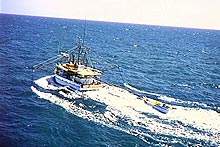|
In groups, students discuss and record why they think it is important to find out about coastal and marine areas, reefs and their resources, both now and in the future.
Consider questions like:
- What patterns can you see when you look at how our reefs, marine and coastal areas are used now and in the past?
- Are our beaches, reefs and coastal areas being used in a sustainable way?
- What do you think we have to do so that our beaches, reefs marine and coastal areas will be used sustainably
in the future? and
- What types of resources do you think beaches and coastal areas will or won’t be able to provide if we continue to manage them in the same way as we do now?
|
TIP
Sustainable means the ability to use, develop or live with a resource without degrading it or its dependent ecosystems now and in the future.
|
|
| |
With older students, introduce the concept of sustainable management or ecologically sustainable development.
In their groups, students consider a range of questions (see below) and prepare an effects wheel to illustrate their preliminary thoughts about the issue:
- If we keep on finding a balance between meeting our present needs for resources while conserving and protecting natural resources for the benefit of future generations, what might this mean for the future? And
- How does what we do as a visitor impact on the Great Barrier Reef and coastal zone?
Imagining the future
Ask students to imagine the possible characteristics of our reefs, marine and coastal areas and the environment in and around them that might exist when they are adults.
Ask students to illustrate possible changes to the Great Barrier Reef that could occur between now and when they are adults:
- What changes do you think might occur to the Great Barrier Reef? Consider reef activities and associated critical issues: eg. over-fishing issues, pollution of an area ‘loved to death’ and people issues such as population increases in the area;
|

Commercial fishing vessel |
- What might a seagrass or mangrove habitat look like in the future? Why?
- What might the environment surrounding the Great Barrier Reef look like, sound like or comprise? and
- What new trends might emerge?
|
|



